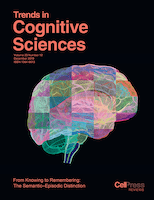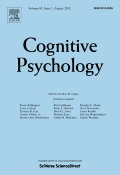
TRENDS IN COGNITIVE SCIENCES
Scope & Guideline
Navigating the Evolving Landscape of Cognition
Introduction
Aims and Scopes
- Interdisciplinary Approaches to Cognition:
The journal emphasizes interdisciplinary research that combines methodologies and theories from various fields, including cognitive neuroscience, psychology, and artificial intelligence, to provide a holistic understanding of cognitive processes. - Mechanisms of Cognitive Function:
A core focus is on understanding the neural and computational mechanisms underlying cognition, including perception, memory, decision-making, and social interactions. - Developmental and Evolutionary Perspectives:
Research often considers the developmental trajectories of cognitive abilities and the evolutionary origins of cognitive functions, addressing how these aspects influence current cognitive science. - Social Cognition and Interpersonal Dynamics:
The journal regularly features studies on social cognition, exploring how individuals perceive, interpret, and respond to social stimuli, as well as the impact of technology and culture on these processes. - Applications of Cognitive Science:
There is a consistent interest in applying cognitive science findings to real-world issues, such as education, mental health, and technology, highlighting the relevance of cognitive research to societal challenges.
Trending and Emerging
- Neurotechnology and Cognitive Enhancement:
There is an increasing focus on how neurotechnologies, such as brain-computer interfaces and neurofeedback, can enhance cognitive abilities and influence learning processes. - Cognitive Implications of Artificial Intelligence:
Research is trending towards understanding the cognitive implications of AI technologies, including how AI can model human cognitive processes and the ethical considerations of AI in society. - Social Media's Impact on Cognition:
A significant increase in studies examining how social media affects cognitive processes, including attention, memory, and social interaction, reflects the growing importance of digital environments. - Integration of Neuroscience and Behavioral Science:
Emerging research is increasingly integrating insights from neuroscience with behavioral science, exploring how biological mechanisms underpin social and emotional behaviors. - Complex Systems Approaches to Cognition:
There is a notable trend towards employing complex systems theory to understand cognition, emphasizing the interactions and interdependencies among cognitive processes and environments.
Declining or Waning
- Traditional Theories of Learning:
There appears to be a waning interest in traditional learning theories that do not incorporate contemporary insights from neuroscience and technology, as newer models focusing on dynamic and computational aspects take precedence. - Static Models of Cognition:
Research that relies on static, non-interactive models of cognition is becoming less frequent, as the field increasingly favors dynamic systems and models that account for variability in cognitive processes. - Cognition in Isolation from Context:
Studies that examine cognition in isolation from social, cultural, and environmental contexts are declining, reflecting a broader trend towards understanding cognition as inherently contextual and interactive. - Narrow Focus on Individual Differences:
There is less emphasis on isolated studies of individual differences in cognition, as the field is moving towards more integrative approaches that consider group dynamics and social influences. - Reductionist Approaches:
Research that takes a purely reductionist approach, focusing solely on neural mechanisms without considering psychological or social dimensions, is seeing decreasing attention in favor of more integrated frameworks.
Similar Journals

AGING NEUROPSYCHOLOGY AND COGNITION
Connecting scholars to the science of aging minds.AGING NEUROPSYCHOLOGY AND COGNITION, published by ROUTLEDGE JOURNALS, TAYLOR & FRANCIS LTD, is a leading scholarly journal that spans the interdisciplinary fields of psychology, neuropsychology, and gerontology. With a strong focus on understanding aging processes and cognitive function, this journal serves as a critical platform for researchers, clinicians, and students dedicated to advancing knowledge in the realm of cognitive aging. The journal, established in 1994, presents high-quality research articles, comprehensive reviews, and innovative studies that contribute to the discourse surrounding mental health and aging. Notably, it has been recognized with a 2023 Q2 ranking in Experimental and Cognitive Psychology and Neuropsychology categories, reflecting its significant impact within these domains. The journal includes open access options, making it widely accessible to a global audience. Researchers interested in the latest findings and theoretical developments in aging neuropsychology will find this journal an invaluable resource, further enhanced by its robust Scopus rankings and commitment to academic excellence through 2024 and beyond.

Frontiers in Human Neuroscience
Advancing the Frontiers of Neuroscience KnowledgeFrontiers in Human Neuroscience is a premier open access journal published by FRONTIERS MEDIA SA, dedicated to advancing the understanding of the complexities of human neuroscience. With an ISSN of 1662-5161, the journal has established its prominence in various fields, achieving a Q2 ranking in categories such as Behavioral Neuroscience, Neuropsychology and Physiological Psychology, and Psychiatry and Mental Health as of 2023. Since its inception in 2008, Frontiers in Human Neuroscience has consistently contributed to the scholarly dialogue by offering a platform for innovative research that bridges the gap between neuroscience and behavioral science. The journal's rigorous peer-review process and commitment to open access ensures that findings are readily available, promoting collaboration and progress within the academic community. With an impact on neuroscience disciplines, it stands at the forefront of the field, inviting researchers, professionals, and students alike to engage with cutting-edge studies and developments. The journal's address is located in Lausanne, Switzerland, where it continues to flourish as a hub for neurobiological exploration.

JOURNAL OF EXPERIMENTAL PSYCHOLOGY-GENERAL
Shaping the Future of Psychological ScienceJOURNAL OF EXPERIMENTAL PSYCHOLOGY-GENERAL, published by the American Psychological Association, is a leading journal in the field of experimental and cognitive psychology. With an ISSN of 0096-3445 and a robust impact factor that reflects its significant contribution to research, this journal serves as a premier outlet for empirical studies that advance our understanding of psychological processes across development and cognition. Covering a wide array of topics from developmental neuroscience to general psychology, it is categorized in the Q1 quartile across multiple fields, making it a vital resource for researchers, professionals, and students alike. The journal has maintained a consistent publication record since its inception in 1975, continuously freeing insights that shape the future of psychology and related disciplines. With rigorous peer review and high standards of scholarly excellence, JOURNAL OF EXPERIMENTAL PSYCHOLOGY-GENERAL remains an essential platform for disseminating innovative psychological research.

COGNITIVE PSYCHOLOGY
Pioneering Research in Cognitive PsychologyCOGNITIVE PSYCHOLOGY is a premier academic journal published by Academic Press Inc. Elsevier Science, specializing in the dynamic and evolving field of cognitive psychology. With a significant history spanning from 1970 to 2024, this journal has established itself as a critical resource for researchers and professionals alike, boasting a distinguished ranking in the Q1 category across multiple disciplines, including Experimental and Cognitive Psychology, Neuropsychology, and Artificial Intelligence. Its impact factor, reflective of its influence and reputation within the academic community, positions COGNITIVE PSYCHOLOGY as an essential platform for disseminating cutting-edge research and theoretical advancements. Although it is not open access, subscribers gain exclusive insights into the latest findings that drive the field forward. The journal's commitment to fostering innovative research makes it an indispensable tool for those dedicated to understanding the complexities of human cognition.

Neuropsychological Trends
Advancing the Frontiers of NeuropsychologyNeuropsychological Trends is a prominent, open-access journal published by LED EDIZIONI UNIV, based in Italy. Since its inception in 2007, the journal has dedicated itself to advancing research in the fields of neuropsychology and cellular neuroscience, catering specifically to the evolving trends shaping these disciplines. With the ISSN 1970-321X and an E-ISSN of 1970-3201, the journal provides a platform for multidisciplinary dialogue and exploration of neuropsychological phenomena. While ranked in the fourth quartile for both Cellular and Molecular Neuroscience and Neuropsychology and Physiological Psychology categories in 2023, the journal encourages innovative research that aims to enhance understanding and treatment of cognitive and psychological conditions. The convergence of years from 2011 to 2024 marks a significant period for contributions that inform clinical practice and theoretical frameworks. As researchers, professionals, and students engage with cutting-edge studies and reviews, Neuropsychological Trends serves as a vital resource for staying informed and fostering collaboration in the neuropsychological community.

COGNITION & EMOTION
Pioneering Research at the Intersection of Thought and EmotionCOGNITION & EMOTION is a leading academic journal published by Routledge Journals, Taylor & Francis Ltd, focusing on the dynamic interactions between cognitive processes and emotional responses. Established in 1987, this esteemed journal has made significant contributions to the fields of Arts and Humanities, Developmental and Educational Psychology, and Experimental and Cognitive Psychology, consistently ranking in the top quartile (Q1) across various categories. Housed in the United Kingdom, COGNITION & EMOTION boasts a remarkable impact factor, underscoring its influence and importance in advancing psychological research and theory. While this journal does not offer open access, it remains a vital resource for scholars, professionals, and students seeking to deepen their understanding of emotional and cognitive phenomena. With a commitment to rigorous peer-reviewed research and innovative insights, COGNITION & EMOTION is essential for anyone aiming to stay at the forefront of psychological studies.

BEHAVIORAL AND BRAIN SCIENCES
Connecting Minds: Where Neuroscience Meets PsychologyBehavioral and Brain Sciences, published by Cambridge University Press, is a pivotal journal focusing on the interdisciplinary fields of Behavioral Neuroscience, Neuropsychology, and Physiological Psychology. With a history dating back to 1978 and ongoing through 2024, this journal serves as a vital platform for researchers, professionals, and students seeking to advance their understanding of brain-behavior relationships. Despite its current Q3 classification in various categories as of 2023, Behavioral and Brain Sciences is recognized for its insightful articles that foster discussions among professionals in the field. While it operates on a subscription model, the journal ensures broad access through individual and institutional subscriptions. Researchers will find this journal not only valuable for publishing their work but also for accessing a diverse range of scholarly articles that address contemporary issues in neuroscience and psychology, thereby enhancing the academic discourse within these evolving fields.

JOURNAL OF COGNITIVE NEUROSCIENCE
Pioneering insights into cognitive processes.Welcome to the JOURNAL OF COGNITIVE NEUROSCIENCE, a premier publication in the field of cognitive neuroscience, published by the esteemed MIT PRESS. Since its inception in 1989, this journal has been at the forefront of advancing our understanding of the neural mechanisms underlying cognitive processes, boasting an impressive convergence period through 2024. With its Q1 ranking in the 2023 cognitive neuroscience category, it stands out among 115 peers, indicating its critical role in shaping contemporary research. The journal offers a comprehensive array of research articles, reviews, and methodologies aimed at researchers, professionals, and students alike, facilitating the exploration of complex cognitive functions. While not an open-access journal, it provides essential insights and significant contributions to the neuroscience community, making it an invaluable resource for anyone keen on delving into the intricacies of the human brain.

QUARTERLY JOURNAL OF EXPERIMENTAL PSYCHOLOGY
Transforming Understanding Through Empirical StudiesQuarterly Journal of Experimental Psychology, published by SAGE Publications Ltd, is a leading peer-reviewed journal that serves as a vital resource in the fields of experimental and cognitive psychology, neuropsychology, and medicine. With an impactful contribution to psychological research, the journal is recognized for its rigorous methodology and empirical studies, holding a notable ranking among its peers—finding itself in the Q2 quartile across several categories. With its origin tracing back to 2006, Quarterly Journal of Experimental Psychology significantly influences the academic discourse until its latest published findings in 2024. Catering to a diverse audience of researchers, professionals, and students, this journal provides Open Access options, enhancing the reach and accessibility of cutting-edge psychological research. By focusing on innovative approaches and findings, it aims to bridge theoretical understanding with practical application, hence fostering advancement in multiple related disciplines. For those committed to understanding the complexities of human behavior and cognitive processes, this journal remains an essential reference point.

JOURNAL OF EXPERIMENTAL PSYCHOLOGY-APPLIED
Advancing the Frontiers of Experimental PsychologyThe JOURNAL OF EXPERIMENTAL PSYCHOLOGY-APPLIED, published by the American Psychological Association, is a premier outlet for cutting-edge research in the field of Experimental and Cognitive Psychology. With an impressive impact factor indicated by its Q1 ranking in 2023, this journal stands as a leading resource for scholars and practitioners, fostering a deeper understanding of the applications of psychological principles. With its extensive coverage from 1995 to 2024, the journal delivers a wealth of empirical studies, theoretical discussions, and methodological innovations that inform both academic learning and practical implementations in psychology. Although the journal does not offer open access options, researchers can gain insights into its influential findings through libraries or institutional subscriptions. Located in Washington, DC, it serves as a critical platform for disseminating high-quality research that bridges the gap between theory and real-world applications, supporting the advancement of knowledge in the vital area of human cognition and behavior.